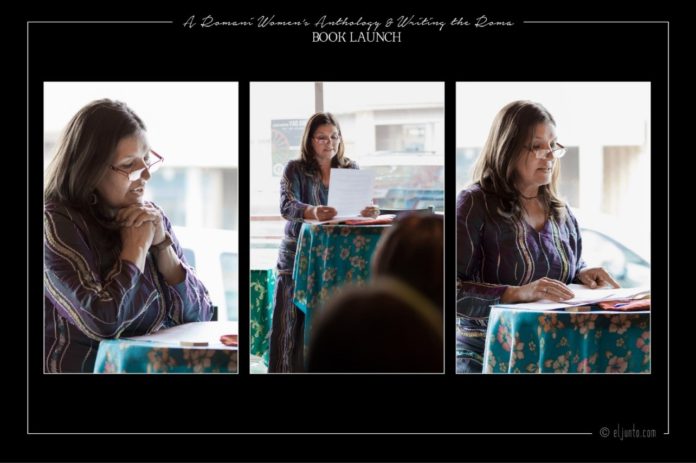Hedina Tahirović-Sijerčić is a writer, professor and translator, born in Bosnia and Herzegovina with a rich successful career in her field of work. The authors of the book #ŽeneBiH (Women from Bosnia and Herzegovina), through their activist and research initiative, have processed the biographies of more than 50 women from Bosnia and Herzegovina who have broken stereotypes and advocated emancipation, and Tahirović-Sijerčić represents one of them.
I was pleasantly surprised that the initiators of the project had followed and observed my long term efforts which began back in 1986 and included me among the fifty most successful women in the history of Bosnia and Herzegovina. It is certainly commendable that in this important book they did not omit Rroma women, that is, the Rroma as people and our contribution to the history of the state of Bosnia and Herzegovina, our homeland. Many authors forget that, we are left out and forgotten, even though we have lived in this area since the 13th century. In these areas, patriarchy, Rromani culture and beliefs did not allow women to speak publicly and freely. The situation is similar to that of other nations, and I believe that women’s credits have been taken by powerful male members of the community. There are many examples, both written and unwritten, among numerous Bosnia and Herzegovina Rroma women of today, and I do not want those unlisted to hold it against me, who are – Medina Vantić-Tanjić, Selma Selman, Aldijana Dedić, Indira Bajramović, Sanela Bešić, Melina Halilović, Daki Đurić, Dalila Ahmetović, Azemina Tomljenović, etc.
Three years ago you published the book “Gender Identities in the Literature of Rroma Authors in the Former Yugoslavia”. What did this book explore and can you share with us some ways in which Rromani authors questioned and perceived their Rromani identity? What are some of the main features of Rromani women’s writing?
This book is the first scientific text that analyses women’s literature and women’s writing of Rromani women and literary history in the former Yugoslavia, identifying ways in which female poets question the power and values of the Rroma patriarchal community. I deal with issues of stereotyping, stigmatisation and discrimination, racism and cultural-racism, issues of women’s identity and criticism, issues of identification, self-assessment and creation of otherness, pointing out through examples of Rromani female poets ways of their exclusion within the patriarchal community, and society as a whole. The silencing of women in literature has been particularly pronounced in the context of Rromani culture, where women experience double exclusion and become an undesirable other.
In this sense, I also refer to those “exiled from their own ones”, which ultimately results in the construction of an identity marked by alienation and exclusion. Examining the life paths of Rromani female poets, their literary ancestors, and (un)acceptance within the community, I conclude that Rroma women’s writing has made the history of Rromani literature, as well as, by its testimonies, the history of the Holocaust against the Rroma.
One of the key topics is that “the otherness created by foreign / other people is more tolerable than “the otherness” of the Other created by one’s own people.” The identity of the otherness of the Other is often suffocated by the wings of tradition and cultural taboos, with the most frequent victims being female children and women.
Dealing with the texts of Rroma female writers, in parallel with their biographies, I have continually noticed their exclusion, leading them to seek a place where they would be accepted and included. In conclusion of my analysis, I tried to find a place for the Rroma women at least within the framework of feminist criticism. My answer is that the history of feminism documents a history of domination and oppression, but Rroma women are excluded from this general feminist process. In this context, Rroma women are different and their poetry is the poetry of differences. Rroma women poets thus become “excluded by the excluded” or a kind of meta-otherness in the literary and cultural space. It is in these situations of alienation and the emergence of a new identity that a “new” literary feminine expression emerged with a wide range of female script forms and styles – especially the “estranged”, “different,” Others that included ” black” women from all continents, national minorities, and among them most often Rroma women, Jews, and members of LGBTIQ communities, and it was them who did not perceive themselves as writers. Thus, their oral traditions, letters, diaries, autobiographies, private poetry and narratives became both the subject of criticism and evidence of women’s consciousness and expression.

Through your work, you have questioned the thesis whether we can consider Gina Ranjičić, Bronisława Wajs Papusza, Ceija Stojko, Katarina Tajkon as literary ancestors of Rromani literature or literary ancestors of women’s Rromani literature. Did you manage to come up with an answer and do you believethat the power of the patriarchal community is still dominant in society?
Based on the findings presented in my book, I consider that Gina Ranjičić, Bronisława Wajs Papusza, Ceija Stojko and Katarina Tajkon represent both literary ancestors of Rromani literature and women’s Rromaniliterature. Of course, I left this thesis open for those who want to question it and seek more detailed answers. I believe that the power of the patriarchal community is still dominant in society, and especially in Rromani society. There are countless examples that can prove it perfectly. All of us women have felt this power ourselves very much.
Has the social position of Rroma women within their own communities been changing and has the position of women in Bosnian-Herzegovian society been changing in general? Have you noticed valuation and progress and do women have to put in more effort than their male counterparts?
Yes, there has been progress because there are laws that allow it. It is true that women need to put more effort than their male counterparts in order for their work to be valued, but this evaluation comes again from men (they have evaluation systems in their hands because they are the ones who make decisions). So here is an example that concerns me personally. I was also the initiator and one of the first lecturers at the Rromani language and Rromani literature and culture studies at the Zagreb Faculty of Humanities and Social Sciences, and very rarely does anyone mention it in their publications, and I even notice that it is deliberately omitted. I emphasise, men are the ones who are editors of publications or editors and publishers in charge. Besides, the commemorative plaque attached to the hallway of the same Faculty in tribute to those Studies does not contain my name, but only male names. I was left out as a woman and as a Rroma woman from that evaluation. That is why I was surprised to be included within the project “Women from Bosnia and Herzegovina”. History should be written based on facts and truth, unfortunately it is not because history is written and made by the powerful, and it is mostly men. Of course, such, we might say “historical” destinies pertain to numerous women, and such destiny has not bypassed me either or many others who have the same experiences. Inspired by this topic, I wrote this poem:
Bojim se… I’m afraid…
Bojim se da mislim,
Bojim se da ne mislim.
Bojim se da razumijem,
Bojim se da ne razumijem.
Bojim se da znam,
Bojim se da ne znam.
Bojim se da kažem,
Bojim se da ne kažem.
Darav….
Dar mae te gindiv,
Dar mae te na gindiv.
Dar mae te haćarav,
Dar mae te na haćarav.
Dar mae te džanav,
Dar mae te na džanav.
Dar mae te vaćarav,
Dar mae te na vaćarav.












